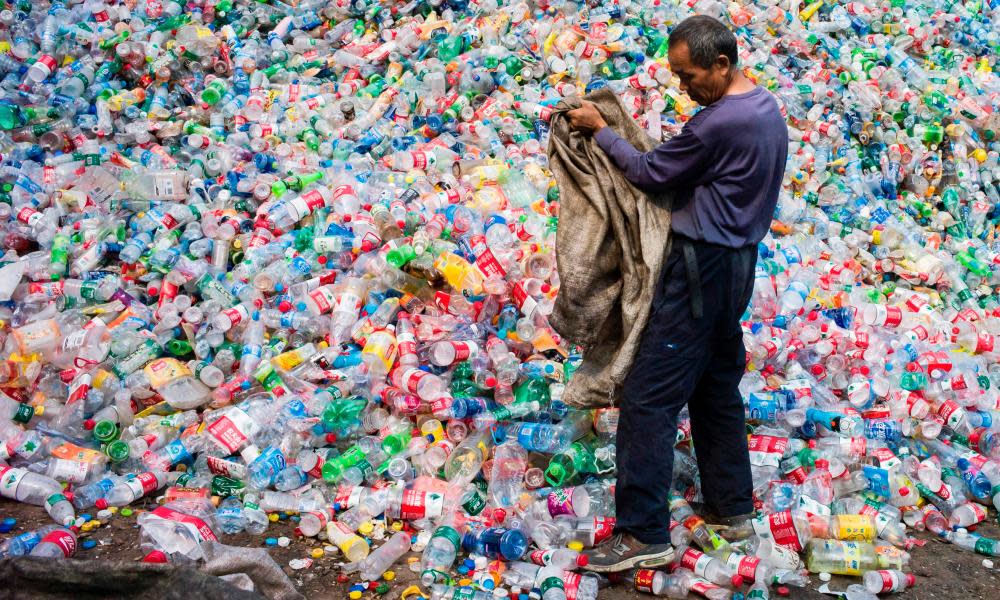Recycling crisis: federal government to push states for solution

The Turnbull government will ask the states to work towards a national fix on recycling in the wake of an import ban imposed by China on recycled waste, which has triggered a crisis in Australia.
Environment ministers will meet on Friday to discuss practical responses to the Chinese ban, with the commonwealth seeking agreement from state counterparts for a national stocktake as the precursor to boosting domestic capacity to recycle.
The energy minister, Josh Frydenberg, will ask the states to review and update their procurement rules as part of a national strategy of working with industry to ensure that all packaging is able to be recycled or reused by 2025.
Frydenberg is also expected to float an increase in the number of projects transforming waste into energy. Federal agencies have spent around $200m pursuing waste-to-energy projects, and the minister is expected to flag further action on this front if projects of sufficient merit can be brought forward.
Australia produces 64m tonnes of waste each year. Before the ban, 30% of plastic and paper products were exported to China. Recycling centres have accumulated growing piles of unrecycled plastics since China imposed the ban on importing foreign waste on 1 January.
Frydenberg told Guardian Australia recycling had not previously been considered a federal issue, but he said a solution to the current problem was “urgent and important”.
He said the commonwealth intended to be cooperative with the states in attempting to find answers.
Ahead of Friday’s meeting, the Victorian environment minister, Lily D’Ambrosio, said national leadership was required to create new supply chains to process recycled waste and ensure usable waste is not sent to landfill.
“There is a nationwide problem in terms of managing and responding to the restrictions of China and Victoria will be seeking some specific responses from the commonwealth tomorrow about what actions they will be taking to help strengthen the recycling markets and to drive new markets for recycling,” she told Guardian Australia.
“Ultimately it’s about trying to add greater value to the recycling waste stream so that we can actually have less waste going to landfill, and potentially be able to achieve a greater value or greater quality so that it can still be exported into China or other markets.”
D’Ambrosio said Australia needed to find an immediate market for its recyclable waste while building its long-term capacity to process waste domestically.
That could include writing requirements for recycled products to be used in commonwealth procurement policies, she said.
D’Ambrosio said she was calling on Frydenberg to present a clear plan of actions the commonwealth could take to deal with the immediate problem of Australia’s waste exports, saying local governments did not have the capacity to respond without assistance.
“The commonwealth has been totally absent in this space and they need to come to the table with a very clear plan of what contributions they will make to deal with these problems immediately, and also what role they will play to ensure that we can develop a recycling industry in the medium to longer term that is sustainable,” she said.
It comes as Victoria announced a $16.5m scheme to develop 130 electronic waste collection sites, ahead of a ban on putting e-waste in landfill that will come into effect on 1 July, 2018.
The funding includes $1.5m for a consumer education program.
The waste management industry in Victoria has criticised the state government for failing to provide a long-term solution, saying a $13m package in February to support ongoing kerbside collection contracts was just a temporary fix to prevent rate rises.
As well as attempting a fix on recycling, Friday’s meeting will also be given the results of an assessment showing that a voluntary phaseout of microbeads in cosmetics and personal care products has been largely successful.
An assessment commissioned by the commonwealth has found that out of approximately 4,400 relevant supermarket and pharmacy products inspected, 6% were found to contain microbeads.
Plastic microbeads are of concern because they pollute the ocean and waterways. Frydenberg said the commonwealth had set a target to eliminate microbeads in 90% of products, with the study indicating a 94% success rate.
“We will continue the good work done to date until 100% of cosmetics and personal care products are microbead-free,” the federal minister said.

 Yahoo News
Yahoo News 
